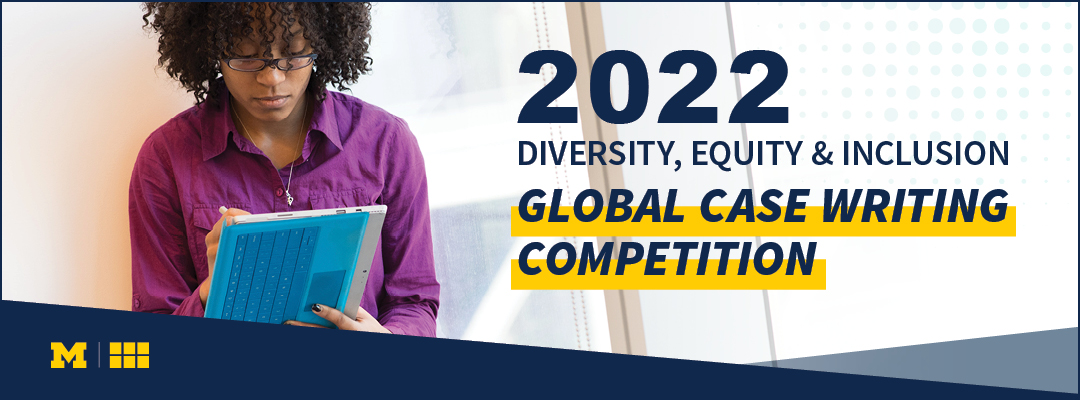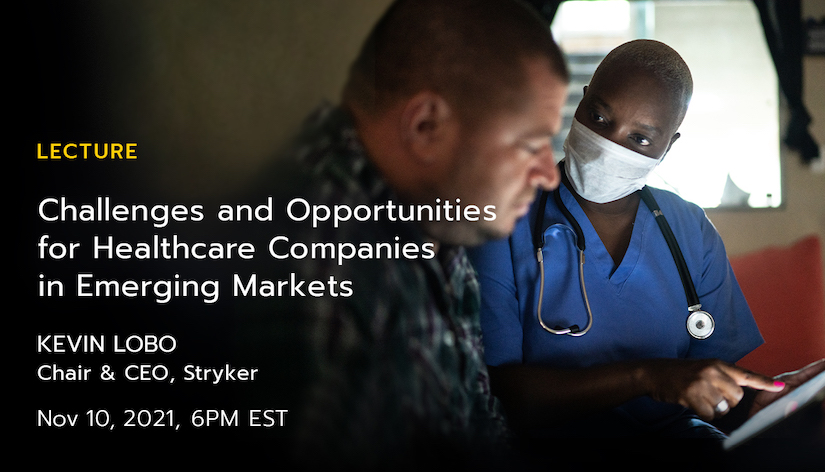
The University of Michigan’s Ross School of Business and the William Davidson Institute again are partnering to broaden the selection of diversity, equity and inclusion-focused business cases with the second annual DEI Global Case Writing Competition.
Administered by WDI Publishing, the competition seeks case submissions designed to help the business world improve its understanding of DEI-related challenges and objectives. Submitted cases may be focused on any business discipline, including accounting, marketing, supply chain operations, strategic management, information technology, economics, entrepreneurship, sustainability and leadership. Cases may also be cross-disciplinary and address a DEI issue that affects multiple areas of a business. Winners will receive prize money of $10,000 for first place, $5,000 for second place, $2,500 for third place, and honorable mentions, as deemed by the finalist judges. The top three winners and honorable mentions will be published and distributed by WDI Publishing.
Strengthening DEI is critical to the success of any organization — and improving these practices requires relevant teaching materials in graduate and undergraduate classrooms. Unfortunately, there’s a shortage of these materials—especially business case studies— that can help better prepare current and future business leaders.
“Diversity, equity and inclusion is so important because it affects every division or department of an organization,” said Sandra Draheim, Manager of Case Publishing at WDI. “That’s why our goal for the competition is to generate more DEI business cases that will help students be better prepared for the future.”
Individual graduate or undergraduate students or teams and other professionals may enter the competition provided they do so in collaboration with a faculty member or instructor from an accredited university/college in the U.S. or internationally. Faculty or instructors may also enter the competition, either individually or in teams. Interested contributors should visit the competition website for additional entry and submission details.
Last year’s inaugural competition drew case submissions from authors across 28 universities and eight countries, culminating in a first-place award to a team that explored Cyrus Mehri’s and the National Football League’s Rooney Rule. This important case presents the league’s efforts to increase representation of coaches of color and asks readers to consider what practices might strengthen or replace the Rooney Rule. The second-place case discusses how the activist brand Oiselle could authentically commit to advancing DEI actions, while the third-place winner asks whether the Indian hospitality business, Lemon Tree Hotels, could replicate its inclusive hiring model if it expanded into the U.S. market. Each of these winning cases is published and available through WDI Publishing.
“I was impressed with the number and quality of submissions for the inaugural DEI Global Case Writing Competition in 2021, and I am excited by the prospect of making the competition bigger and better in 2022,” said David Wooten, Associate Dean of One-Year Masters Programs at the Ross School of Business and University Diversity & Social Transformation Professor at U-M.“We look forward to continuing our mission of diversifying the pool of DEI cases that leading business schools use to educate their students.”
The first two reviews of the 2022 competition submissions will be double-blind, meaning submitters will not know the identity of the reviewers and vice versa. Likewise, the finalist judges will not be aware of the names or affiliated universities of the finalist cases. Finalist judges currently include Kim Eric Bettcher, leader of the Center for International Private Enterprise’s Policy and Program Learning initiative; John Lafkas, a Senior Editor at Harvard Business Publishing; and Greg Merkley, Director of Case Publishing at the Kellogg School of Management.
To learn more about the 2022 DEI Global Case Writing Competition, and how to contribute to the growing number of DEI cases used by students across the world, join the first of three informational webinars. Register here to participate on Nov. 17, and check here for upcoming details on future webinars. Prepare now for the intent-to-enter form deadline on Jan. 28, 2022, and the final submission deadline of March 31, 2022. All 2022 DEI Global Case Writing Competition details can be found here.
Questions should be directed to info@wdi-publishing.com.

The possibility and interest in serving these markets and helping to make healthcare better creates opportunities for job seekers, companies and healthcare professionals. However, organizations face significant challenges in developing business models that can provide quality products and services and do so profitably. As more companies are successful, the local communities and patients will continue to benefit.
The keynote speaker for WDI’s Ralph J. Gerson Distinguished Lecture, Kevin Lobo, Chair and CEO of Stryker, provided perspective and insights for innovating and driving growth in LMICs. With globalization as part of the company’s strategy, Lobo has continued to focus resources and talent on key global markets since becoming CEO of Stryker in 2012. Lobo’s talk focused on “Challenges and Opportunities for Healthcare Companies in Emerging Markets.”
Headquartered in Kalamazoo, MI, Stryker is one of the world’s leading medical technology companies, offering innovative products and services in orthopaedics, medical and surgical, and neurotechnology and spine that help improve patient and hospital outcomes.